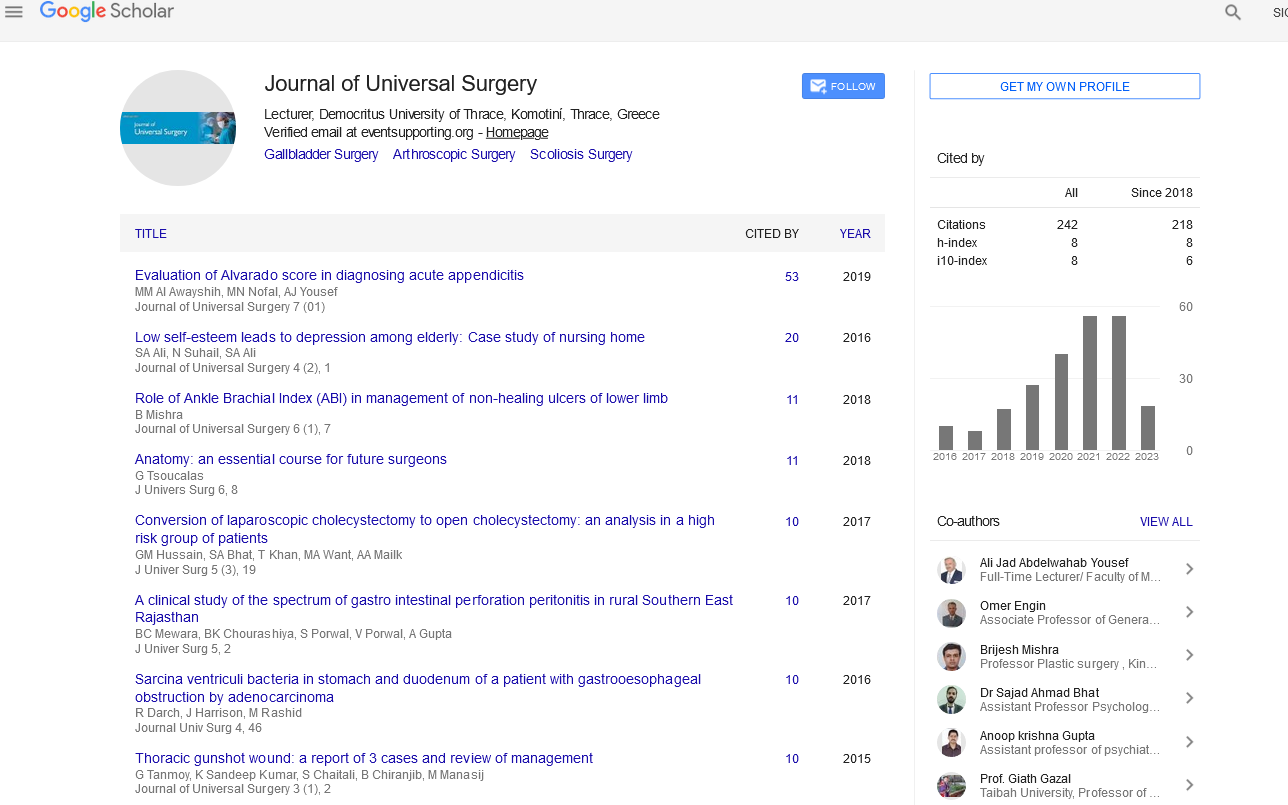Perspective - (2024) Volume 12, Issue 4
Complications of Open-Heart Surgery
Shelia Sobek*
Department of Cardiology, Lundby University, Lundby, Denmark
*Correspondence:
Shelia Sobek, Department of Cardiology, Lundby University, Lundby,
Denmark,
Email:
Received: 04-Jul-2024, Manuscript No. IPJUS-24-15028;
Editor assigned: 09-Jul-2024, Pre QC No. IPJUS-24-15028 (PQ);
Reviewed: 23-Jul-2024, QC No. IPJUS-24-15028;
Revised: 01-Aug-2024, Manuscript No. IPJUS-24-15028 (R);
Published:
29-Aug-2024
Introduction
Open-heart surgery is a critical procedure used to treat
various cardiac conditions, including coronary artery disease,
valve disorders and congenital heart defects. While this surgery
can be life-saving, it carries significant risks and potential
complications. This article delves into the myriad complications
associated with open-heart surgery, their causes, preventive
measures and management strategies.
Open-heart surgery involves making an incision in the chest to
access the heart. The procedure can include Coronary Artery
Bypass Grafting (CABG), heart valve repair or replacement and
congenital heart defect repairs. Advances in medical technology
and surgical techniques have improved outcomes, but
complications remain a concern.
Description
Common complications
Bleeding: Excessive bleeding can occur during or after surgery.
It may result from surgical trauma, coagulation disorders or
anticoagulant medications. Severe bleeding might necessitate
reoperation and can lead to significant morbidity.
Infection: Surgical Site Infections (SSIs) are a significant risk,
with potential for superficial or deep infections. Mediastinitis, a
deep infection, is particularly serious and can be lifethreatening.
Risk factors include diabetes, obesity and
prolonged surgery time.
Arrhythmias: Postoperative arrhythmias, particularly atrial
fibrillation, are common after open-heart surgery. These
irregular heart rhythms can cause symptoms like palpitations,
shortness of breath and increase the risk of stroke:
Heart attack: Though the surgery aims to improve heart
function, paradoxically, it can sometimes result in a myocardial
infarction. This may occur due to reduced blood flow to the
heart during the procedure.
Stroke: Stroke is a severe complication arising from emboli
dislodged during surgery or due to prolonged low blood
pressure. It can lead to long-term neurological deficits and
significantly impact recovery.
Respiratory complications
Pneumonia: Patients are at risk of developing pneumonia due
to prolonged intubation, immobility and weakened immune
response post-surgery:
Acute Respiratory Distress Syndrome (ARDS): ARDS can
result from inflammation and fluid accumulation in the lungs,
impairing oxygen exchange and necessitating prolonged
mechanical ventilation.
Respiratory failure: Respiratory failure may occur if the lungs
cannot adequately exchange gases, requiring extended
ventilatory support.
Renal complication0073
Acute Kidney Injury (AKI): AKI is a common postoperative
complication caused by reduced blood flow to the kidneys,
nephrotoxic drugs, or prolonged hypotension. It may require
temporary dialysis and impacts long-term kidney function.
Neurological complications
Cognitive dysfunction: Post Operative Cognitive Dysfunction
(POCD) is characterized by impaired memory, concentration, and
cognitive function. It can be transient or persistent and is
influenced by factors like age and preexisting cognitive
impairment.
Delirium: Delirium, an acute confusional state, is common
after open-heart surgery. Risk factors include advanced age,
preexisting cognitive impairment and the use of sedatives.
Cardiovascular complications
Low cardiac output syndrome: This condition arises when the
heart cannot pump sufficient blood to meet the body's needs,
often requiring inotropic support or mechanical assist devices.
Pericardial effusion and tamponade: Fluid accumulation in
the pericardial sac can compress the heart, impairing its function
and requiring drainage.
Gastrointestinal complications
Gastrointestinal bleeding: Stress-related mucosal disease or
anticoagulant therapy can lead to gastrointestinal bleeding,
necessitating endoscopic or surgical intervention.
Bowel Ischemia: Reduced blood flow to the intestines can
cause ischemia and infarction, a life-threatening condition
requiring prompt surgical intervention.
Wound complications
Dehiscence: Wound dehiscence, or the reopening of the
surgical incision, can occur due to poor healing or infection,
requiring additional surgical repair.
Keloid formation: Excessive scar tissue formation can lead to
keloids, which may be painful or restrict movement, often
requiring further treatment.
Long-term complications
Chronic pain: Persistent pain at the incision site or in the
chest can occur due to nerve damage or scar tissue formation.
Heart failure: Despite initial success, some patients may
develop heart failure over time due to progressive disease or
surgical complications.
Prosthetic valve complications: Patients with prosthetic heart
valves may experience complications like valve thrombosis,
endocarditis or structural degeneration, necessitating lifelong
monitoring.
Preventive measures
Preoperative optimization: Optimizing a patient's health
before surgery, including controlling diabetes, quitting smoking
and managing weight, can reduce the risk of complications.
Surgical techniques: Minimally invasive surgical techniques
and careful intraoperative management can reduce trauma and
improve outcomes.
Postoperative care: Intensive postoperative monitoring and
care, including early mobilization, infection control and vigilant
monitoring for complications, are crucial for recovery.
Management of complications
Multidisciplinary approach: A multidisciplinary team
approach involving cardiologists, surgeons, intensivists and
nurses is essential for managing complications effectively.
Early detection and intervention: Prompt identification and
treatment of complications can significantly improve outcomes.
This includes the use of advanced imaging, laboratory tests and
vigilant clinical observation.
Conclusion
While open-heart surgery can be life-saving, it carries a risk of
serious complications. Understanding these risks, implementing
preventive measures and ensuring prompt management are
essential for optimizing patient outcomes. Continuous
advancements in surgical techniques, postoperative care and
patient management are vital in reducing the incidence and
impact of these complications.
Citation: Sobek S (2024) Complications of Open-Heart Surgery. J Univ Surg Vol.12 No.4: 039.,





